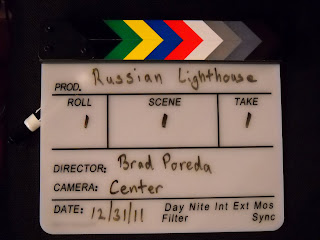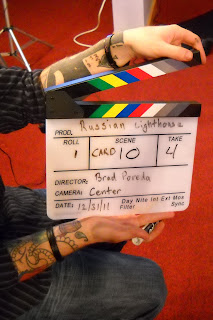 She arrived scared at age nine, wearing a little necklace her mother had made. Overwhelmed and unable to answer when another orphan asked her about it, the pint-sized bully tore it off her. Our girl, who we’ll call Oksana, was devastated, and remembers no one cared. She didn’t know how she could live in such a place. All the kids were together, and no mother or father was there to help her. She was confused, a word she uses often in our conversation. “What will happen to me? How will I get out of here?” were questions tormenting her then. Workers apprised her of the most important rules, but the rest she learned by trial and error, or by emulating veteran orphans.
She arrived scared at age nine, wearing a little necklace her mother had made. Overwhelmed and unable to answer when another orphan asked her about it, the pint-sized bully tore it off her. Our girl, who we’ll call Oksana, was devastated, and remembers no one cared. She didn’t know how she could live in such a place. All the kids were together, and no mother or father was there to help her. She was confused, a word she uses often in our conversation. “What will happen to me? How will I get out of here?” were questions tormenting her then. Workers apprised her of the most important rules, but the rest she learned by trial and error, or by emulating veteran orphans. To her distress, she awoke her first morning and remembered she was an orphan when a teacher flipped on the lights with a barked, “Wake up!” She couldn’t believe she really was in an orphanage, and she certainly did not want to be there. She was positive the day was hopeless; they were planning to send her to school, and her shoes were worn. She looked like an orphan. Other students were sure to giggle.
Oksana was assigned to a living group of about 12 girls, though that number fluctuated as kids came and went. When there were as many as 15 girls, there weren’t enough beds, so they took turns sleeping with another group. For frigid winter nights, Oksana had two blankets, and slept in two pairs each of pants, sweatshirts, and socks. Bedtime was 9:30 p.m.; once in bed, kids were not to get up, even for the bathroom. During the early days, she didn’t dare talk, or breathe; snoring at night might be rewarded with a smack from the monitor.Meals were eaten together. Supper consisted of soup, rice, meat, and bread; she could have a drink only if she finished her food. If she was tardy, someone else might already have helped themselves to her food. No second helpings were served, even when she was still hungry.
 Kids took showers once or, sometimes, twice per month; hot water was never guaranteed. When Oksana’s hair got too greasy, she would run water over it in the sink. The group shared a blow dryer; if one wasn’t quick to grab it, she would have to go to school with wet hair. Without boots, Oksana’s feet were chilled throughout winter. Clothes were changed once weekly. Many of the girls had matching jeans and coats, which made things confusing, but being conspicuous at school in their orphan “uniforms” was even worse.
Kids took showers once or, sometimes, twice per month; hot water was never guaranteed. When Oksana’s hair got too greasy, she would run water over it in the sink. The group shared a blow dryer; if one wasn’t quick to grab it, she would have to go to school with wet hair. Without boots, Oksana’s feet were chilled throughout winter. Clothes were changed once weekly. Many of the girls had matching jeans and coats, which made things confusing, but being conspicuous at school in their orphan “uniforms” was even worse. Inequity at school between kids with families, called “home” kids by another orphan I spoke with, and kids without, was rampant. Home kids ate lunch at school. Orphans had only a snack, like an apple and beverage, and waited to eat lunch until they returned to the orphanage around 3 p.m. Oksana was a conscientious student, but hunger sometimes made concentration challenging. Home kids had textbooks, but there were seldom enough for the orphans. She would look around in class, seeking someone willing to share theirs with her.
After school, an orphanage bus drove kids home. The orphans harassed anyone late for the bus; they were hungry, and clamoring for their belated lunch. Eating was followed by outdoor activity for precisely an hour, then 2.5 hours of homework. One staffer per group assisted with schoolwork, though if several girls had questions, she might not have time to help them all. Kids sat at the table, whether or not they had homework. Evenings included chores, rotated on a weekly basis. Sundays were seldom restful; sometimes, they worked at chores most of the day.
Riding the bus precluded kids from being able to participate in after-school activities. When home kids stayed late to have cake for a holiday, the orphans got nothing, except their ride. When school friends invited her to their homes, she had to decline, though they could visit her. Home kids in home economics supplied their own food ingredients, but the orphanage did not have fancy cooking supplies to donate. Activities requiring money were never an option.
Some students reviled the orphans. A hooligan once pushed Oksana into a snowpile, demanding, “Why are you in the orphanage?” When she wouldn’t tell him, everyone teased her. Even some school teachers participated; one was particularly hard on orphans because a specific child annoyed her. “You don’t have a dad?” she taunted him, lambasting all orphans as troublemakers. “Not all of us are doing bad things!” Oksana thought.
Birthdays were giftless, nearly joyless affairs; she would receive an apple, one chocolate, a cookie, and tea. Kids and the staff wished her happy birthday, but never sang her a song. Being first to say “Happy birthday!” became a competition; in her enthusiasm, Oksana sometimes won by waking the birthday child up. Still, her own birthday almost made her feel worse, since everyone knew home kids really celebrated theirs.
Despite the shortage of essentials, almost every orphan over the age of nine possessed a cell phone. Oksana explained orphanage graduates sometimes bought the devices for their younger siblings and kept them replenished with minutes, or teachers might buy for a favorite child. Other kids did odd jobs at summer foster homes to earn money for theirs. At bedtime, phones were surrendered; the head of the orphanage checked them for inappropriate games and music, punishing infractions by keeping the phone several days.
As Oksana aged, the orphanage stayed scary. Once a drunk wandered onto orphanage property and blocked the fire escape until the police chased him away. Another orphan had a mentally unstable mother who visited, spreading a pungent malodor which lingered longer than she did. Eyeing the children as they ate, she would demand their food.
A forest surrounded the orphanage, and kids told tales of nighttime horrors happening there; some may have been true. It terrified Oksana to go out alone after dark to empty the trash. Older, meaner kids threatened the younger with evils better left unspoken, to commandeer more desirable beds, or steal candy, or get their way. Reporting mistreatment to a teacher assured retribution; many times orphans told us their best friends were the kids who protected them. There were few truly safe places for possessions in the orphanage. When Oksana returned from her Lighthouse Project trips, she unpacked her gifts while everyone else was outside. Otherwise, stronger kids would menace, “I want that,” until she relinquished her treasures.
The orphanage leader was a helpful lady Oksana complimented as “good” and “nice.” Though hamstrung by limited resources, she tried to make the kids as comfortable as possible, once having Oksana’s group’s room repainted. As work progressed, the girls slept on mattresses in the gym a few weeks, snuggling together for warmth. Oksana was mortified when some of the older boys seized the opportunity to leer at them there, when they were not decently dressed. They had a long walk to use the bathroom, and the same boys smirked and made rude remarks each time a girl left the gym.
But the kids found makeshift pleasures in things like sliding down hills on trash bags. Young children shared several bicycles with perpetually flat or missing tires. Older kids loved riding the single bike designated for their use, though Oksana got only one ride the entire time she lived there. In spring and fall, the orphans swam in a public pool twice monthly, wearing threadbare swimsuits either too big or small. The garments looked “very, very old,” and sometimes fell down. Summers were a relief, wading knee deep in a creek behind the orphanage without the burden of humiliating swimwear.
Oksana’s best memories were of her group spending time with her teachers during holidays. They played in the snow, had scavenger hunts, held contests making things, or went ice skating. When an elderly babushka needed help, they might oblige. She enjoyed art classes in the orphanage’s craft room, and tending the orphanage’s houseplants. Ironically, even the deprivation of the orphanage afforded more opportunity to experience things than she could have with her biological family. Orphans went to camp for several weeks in summer, or stayed with foster families. But not all who fostered were kind; those who disliked a child might return her to the orphanage early. Her animation in sharing the better times made me wonder if she liked the orphanage, or some elements of it. But she said she was never truly happy, explaining, “Almost all kids want a mother and father for a family, but the orphanage doesn’t give you that. And sometimes you want a family.”
Several preschool children idolized Oksana for her kindness; as she left the orphanage on her final day there, her new mom saw one small boy embrace her tightly, before they all parted with teary eyes. And though she is safe with her forever family, Oksana now worries for those left behind. When she readied a care package for an extra special friend, her mom wanted to send a swimsuit. Oksana refused, judging it better to suffer a saggy suit in company, than sport a new suit alone, inviting ridicule, theft, or a fight to keep it. She desperately wants the orphans to fit in, but doesn’t want her friend courting the abuse she knows accompanies good fortune.I asked her about orphan dreams. “Everybody in orphanage—all of them—kids want to have family and they want to be with father and mother. They wait so somebody can adopt them from orphanage. If some family adopt somebody, they were so happy to have father and mother,” she told me.
Oksana’s memories make her sad, but she selflessly shares them anyway. She yearns to help the kids still there, and it’s something she can do. Perhaps, she reasons, if families know the truth, if they know what it’s like to live in an orphanage, they’ll realize they have to help.Have to.
Her friends are waiting.*****
Recommend this post, and help orphans, by liking it below.





















